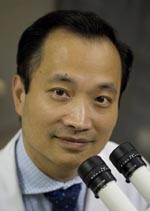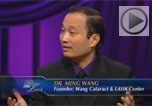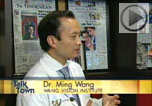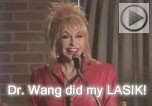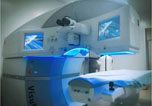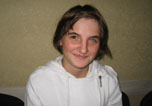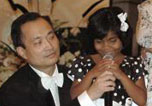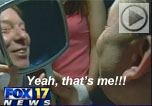- Over 55,000 LASIK and cataract procedures (including on over 4,000 doctors)
- The FIRST center in TN to offer Laser Cataract Surgery
- Introduced bladeless all-laser LASIK to the state
- Implanted the state's first FOREVER YOUNG™ Lens
- The first surgeons in the US to perform a new Intacs surgery to treat keratoconus
- Helped patients from 40 states and 55 countries
- International referral center for cataract surgery and LASIK complications
- Read Dr. Wang's book: LASIK Vision Correction
Why did you decide to have LASIK? Why did you choose Dr. Wang? How has your life changed since your LASIK procedure?
What is your advice for people considering LASIK?
Click to read more
| Article Library | Print This Page |
How an Atheist Who Survived Horrors of China’s Culture Revolution Found Jesus
written by Billy Hallowell

From enduring China’s infamous the ten-year catastrophe to finding success as a medical doctor after emigrating to the U.S. nearly penniless and with no knowledge of the English language, Dr. Ming X. Wang has proven that he’s a survivor.
Wang, a renowned eye surgeon based in Nashville, Tennessee, and the author of “From Darkness to Sight: A Journey from Hardship to Healing,” recently described the dire situation that spanned from 1966-1976, one that threw China into cultural upheaval.
At the time, Wang was a young man growing up in the beleaguered country, an experience that he described as harrowing, confusing and terrifying. He said that Zedong had “decided the best way to keep on dictating was to keep people ignorant [and] the best way to keep people ignorant was to destroy the education of all the young people in the entire country.” Wang’s own journey was deeply impacted by those efforts.
Wang noted that, under Zedong, universities were shut down in 1966 and that junior and senior high school students were forcefully deported and condemned to a life sentence of hard labor and poverty; some were even killed. Over the 10-year period, he said the government “destroyed the future of 20 million young people.”
When he was just 14 years old and finishing the 9th grade, he, too received a deportation order that would forever change his path.
“My education was completely cut off permanently,” Wang said.
But rather than bow to the deportation order, he decided to desperately seek any and all options that would keep him out of the work camps, taking up music and even dance, as those professions kept young people at home and exempted them from deportation. After all, entertainment was still valued by the government.
“In the mid-1970s, tens of thousands of us were playing some kind of instrument,” Wang explained, noting that the government eventually realized that people were gaming the system in an effort to avoid deportation. At that point, Wang turned to dance, using that, too, to maintain his freedom.
“I didn’t learn these as hobbies,” he said. “I learned them to survive.”
Reflecting on that time, Wang recalled playing music by a blind artist—something that had a profound impact on him and, he believes, helped lead him to a career as an eye specialist and surgeon.
“Decades later… I restore eyesight for patients, bringing them out of darkness,” he said. “I think it probably has something to do with that period of time when I was playing [the blind artist’s music]. Later on, that imprinted on me… I want to help them, because I used to suffer myself.”
When 1976 rolled around, Wang said he was finally about to be deported when Zedong suddenly died, sending shockwaves throughout China.
“All the sudden, China woke up,” he said. “They closed the ten-year catastrophe and reopened all of the colleges.”
RELATED CONTENT: North Korea’s Human Rights Issues—This is How You Can Help
But after years out of school, Wang was at a severe disadvantage. Determined to have academic success despite the setbacks, he studied hard and found himself faced with the impossible: preparing for college after years of being out of academia.
“I almost killed myself studying,” he said, noting that he eventually did get into college. Then, when he was 21 years old in 1982, his relatives came together to gather enough money for a one-way airplane ticket to America.
When 1976 rolled around, Wang said he was finally about to be deported when Zedong suddenly died, sending shockwaves throughout China.
Armed with a Chinese-English dictionary, a briefcase and a nice suit, he flew to the foreign land to start his new life. When he landed, he was totally taken aback at the presence of skyscrapers and other elements showcasing American wealth.
“It was shocking… because communist brainwash for years before that told me America was a really poor country,” he said.
Wang, who had barely any money, no clothes aside from the suit and knew no one, proceeded to start his life in the U.S., attending college, becoming a doctor and finding Christianity—a personal faith that has transformed his life.
It was during his time at Harvard Medical School that Wang, who also has a degree from MIT, started to think more deeply about the atheistic worldview he had been raised under. The complexities of the eye were just one of the elements that forced him to think deeper about life beyond this spiritual realm, as TheBlaze reported.
In the end, those considerations, among many others, led Wang to abandon atheism and embrace the Christian faith.
Now, he’s hoping is autobiography, “From Darkness to Sight: A Journey from Hardship to Healing,” will help “encourage and motivate” American youths to think deeper and appreciate their freedoms more profoundly so that they can ensure that they never lose them.
“With the technology development and modern standard of living, kids today have more stuff than we have had before and human nature is,” he said. “When you have lots of things, one tends to be less motivated.”
Wang continued, “Who appreciates freedom the most? Those who used to not have freedom.”
It should be noted that Wang’s story has been so transformational that he served as the real-life inspiration for Martin Yip, one of the main characters in Pure Flix’s hit film “God’s Not Dead.”
Our new texbooks
A 501c(3) charity that has helped patients from over 40 states in the US and 55 countries, with all sight restoration surgeries performed free-of-charge.


